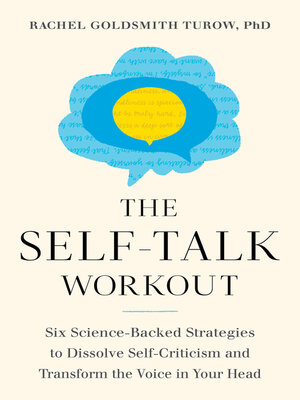The Self-Talk Workout
ebook ∣ Six Science-Backed Strategies to Dissolve Self-Criticism and Transform the Voice in Your Head
By Rachel Goldsmith Turow

Sign up to save your library
With an OverDrive account, you can save your favorite libraries for at-a-glance information about availability. Find out more about OverDrive accounts.
Find this title in Libby, the library reading app by OverDrive.



Search for a digital library with this title
Title found at these libraries:
| Library Name | Distance |
|---|---|
| Loading... |
Self-talk matters, but what methods of building healthy self-talk actually work? This how-to guide shares evidence-based techniques to go from being your own worst critic to your own best friend.
Perhaps you want to be nicer to yourself but don’t really know how to get there. Or maybe you’re someone who assumes self-criticism is a permanent part of your personality. Rest assured you’re not alone—millions of people struggle with the toll that excessive self-criticism takes on their minds, energy levels, jobs, and relationships. And problems with self-talk vary dramatically from one person to the next: they can appear as mild but persistent inner criticism, full-blown self-loathing, or the pain of internalized oppression or abuse.
After over twenty years of working with individuals, groups, and classes on self-criticism and related challenges, psychologist and mindfulness teacher Dr. Rachel Goldsmith Turow offers the “self-talk workout”—six doable exercises that can help you replace self-criticism with self-kindness and self-encouragement. Specific self-talk strategies such as “Spot the success,” “Fail forward,” and “Allowing all feelings, skillfully,” require just a few minutes a day. These skills can be practiced individually to transform your self-talk, or you can choose to combine two or more exercises to enhance your self-talk workout. Each chapter features a core exercise, variations on the strategy that might feel right for you, scientific studies supporting each approach, and success stories to inspire your own practice.
Turow includes examples from her own life and experiences as a psychotherapist, as well as lessons from her students and respected public figures such as Michelle Obama and Thich Nhat Hanh, to show that the burden of harsh self-criticism need not go on forever: the way that we relate to ourselves can be changed.
Perhaps you want to be nicer to yourself but don’t really know how to get there. Or maybe you’re someone who assumes self-criticism is a permanent part of your personality. Rest assured you’re not alone—millions of people struggle with the toll that excessive self-criticism takes on their minds, energy levels, jobs, and relationships. And problems with self-talk vary dramatically from one person to the next: they can appear as mild but persistent inner criticism, full-blown self-loathing, or the pain of internalized oppression or abuse.
After over twenty years of working with individuals, groups, and classes on self-criticism and related challenges, psychologist and mindfulness teacher Dr. Rachel Goldsmith Turow offers the “self-talk workout”—six doable exercises that can help you replace self-criticism with self-kindness and self-encouragement. Specific self-talk strategies such as “Spot the success,” “Fail forward,” and “Allowing all feelings, skillfully,” require just a few minutes a day. These skills can be practiced individually to transform your self-talk, or you can choose to combine two or more exercises to enhance your self-talk workout. Each chapter features a core exercise, variations on the strategy that might feel right for you, scientific studies supporting each approach, and success stories to inspire your own practice.
Turow includes examples from her own life and experiences as a psychotherapist, as well as lessons from her students and respected public figures such as Michelle Obama and Thich Nhat Hanh, to show that the burden of harsh self-criticism need not go on forever: the way that we relate to ourselves can be changed.






